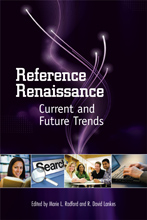 Just received a package with my author’s copies of Reference Renaissance: Current and Future Trends. The book is built from the papers and presentations at the Reference Renaissance Conference in Denver. It is a really great volume of what is happening in reference and I am thrilled to see the tradition of good research and good practice continuing from the VRD conferences of ‘ole.
Just received a package with my author’s copies of Reference Renaissance: Current and Future Trends. The book is built from the papers and presentations at the Reference Renaissance Conference in Denver. It is a really great volume of what is happening in reference and I am thrilled to see the tradition of good research and good practice continuing from the VRD conferences of ‘ole.
Reference Renaissance: Current and Future Trends
Reference Renaissance: Current and Future Trends. Radford, M., and Lankes, R. David (Eds.). (2010). New York: Neal-Schuman Publishers.
A Call for a New Librarianship
“A Call for a New Librarianship” HMCPL Staff Development Day, Huntsville, AL.
Slides: https://davidlankes.org/rdlankes/Presentations/2010/TexasAdobe.pdf
Audio: https://davidlankes.org/rdlankes/pod/2010/TexasHMCPL.mp3
Screencast:
Rdlankes-ACallForANewLibrarianship514 from R. David Lankes on Vimeo.
Bullet Point: Dear Google, you too need to talk to librarians
So the Buzz on Google Buzz is decidedly not so good. I’m not going to spend any time on features, or impact, or the idea of integrating social networks with email. This has all been nicely covered elsewhere. Instead, what caught my eye was a decidedly and deservedly profane piece I read on Gizmodo titled “F*ck You, Google.” Be warned, the * is not used throughout the piece, but read it anyway.
The gist of the piece is a mid-twenties woman who has worked hard to protect her identity as she blogs about issues she cares deeply about, and can draw some very unwanted attention from the wrong people. Buzz is thrust upon her and her first friend, automatically now seeing her other friends, and RSS annotations through Google Reader. Worse still she now is friends with commentors on her “anonymous” blog because she routed mail to her blog to her GMail account.
OK, so this would seem like a straight line that Google needs to talk about librarians because we care about privacy. But the real thing I’d like you to think about is that librarians need to talk about privacy to our members in a much more forceful and complex way. How many workshops and discussions do you have with members about Facebook’s privacy filters (probably a bunch), and how many do you have with them about the potential dangers of this kind of information in the hand of third parties and the long term implications of cloud computing (probably fewer)? Do you ever help members do a privacy audit where you walk them through their online life and point out potential issues and problems? Are you ready to do that?
I have met too many librarians who take a myopic approach to privacy. That is, privacy is so important to our members that we don’t even let them decide what information to keep or share. We just wipe all our records after some time so they don’t get caught up in the Patriot Act web. What’s worse, we feel that by creating an environment that protects privacy (by eliminating choice) we are protecting the members, when in fact the information they would expose to us is so inconsequential compared to their other activities it almost doesn’t matter.
Does it matter that we delete any identifying information on our systems when every keystroke they send to our sites can be captured by their Internet service providers? In fact we may be creating an illusion of privacy that does our members a disservice. We must not have a black and white approach to privacy – either you have it or you don’t. Instead we need to learn from Google Buzz that the best of intensions, without a matched deep understanding of the complexities of interconnected systems, can lead to disaster.
This also means that you need to have a pretty sophisticated technical understanding of cloud computing and interconnected systems…not to be a techy, but to implement your values.
Rather than waiting for Google to provide object lessons, we need to see our environments (physical spaces, online services, etc.) as a place that protects privacy by exposing complexities and education, not by creating an air of anonymity. By being active and activists in the area of privacy (not removing the choice) we do our members more good. We also have a stronger position to knock on the door of Google and say we are nervous and here to help.
So while I’m on the Buzz subject I have some more unrelated questions:
1. As a librarian when you heard about Buzz did you first ask yourself how can I use it to promote the library instead of, what are the implications of this tool for my members?
2. When you look at Buzz do you ask yourself how can Google make this better, or how can librarians do it better?
Just some thoughts for a winter day.
OCLC Global Scope of Library Activity
Thanks to Stephen Abram for the link to a new OCLC piece:
http://www.oclc.org/uk/en/nextspace/014/librarystatistics.htm
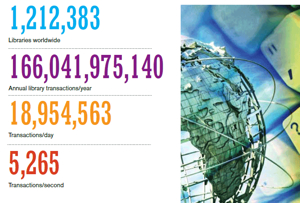
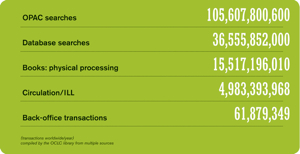
Manuscript Submission
So in case you were wondering why posts and talks have slowed down this past year I thought I’d share some pictures. Well, why I can’t give too many details yet, I can show you:
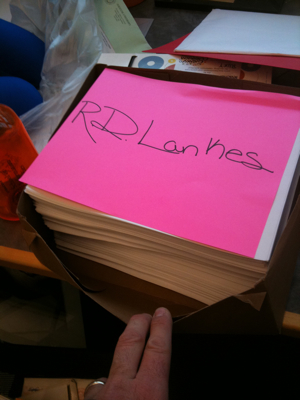
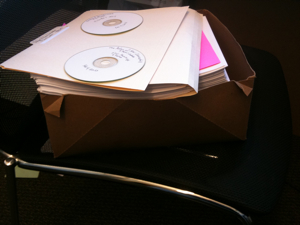
Yup, that is about 1,300 pages of my next book going into the mail (don’t worry, it is all double spaced and big margins for editing – the final book will be much smaller). More on the book (and how it fits into a larger project) later.
For now, I’d like to just take a moment to apologize to my family for a year staring at the back of my head.
Bullet Point: Dear Steve Jobs, iBooks has me Nervous
…or, Why Apple should talk to librarians about iBooks.
What makes me nervous about iBooks, the new eBook app from Apple targeted for their iPad, is not what you might expect. DRM, cost models doesn’t worry me. These are mostly imposed by the publishers, and we saw how this played out in music and MP3’s. It is certainly not that eReaders or the move away from physical books in some way endangers the future of the library. Libraries are about knowledge and facilitation, not artifacts and stuff.
No, what worries me about iBooks is that it is so damn boring. I actually found myself angry and disappointed after the big iPad announcement. I expected so much more. I was a little apprehensive about posting these thoughts because I haven’t actually seen the iBooks software. So for all I know, everything I am about to say is there, but there just wasn’t enough time to talk about them. So if that is the case, Apple, my bad. If not, what were you thinking?!
You have a reputation for reinventing things. The iPod, iPhone, etc were amazing because they did things I always wanted and didn’t know, or they did something I had been doing, and suddenly realized there was a much better way. Cool.
So ebooks… apparently I was missing color and a really cool page turning animation? Really? I still look at the promo video and say to myself, it is like watching a video of someone reading a hardcover book, and calling it digital. I can buy a book with a click of button and download it in real time. Cool, and then it goes on, wait for it, a little wooden bookshelf that can’t show more than 15 or so books? PLEASE PLEASE PLEASE tell me there is more there.
Here’s where talking with a librarian would help. First, we understand that books are inherently social things (to be precise the act of reading, not the books themselves). We pick the next book based on recommendations, or from talking with other folks. Also, we pass them around to stimulate discussions. We highlight them for ourselves and for others. Librarians also understand that you need to arrange these books by something more than title. This is not about Dewey and classifications, it is about people and their bookshelves. I put science fiction together, sure, but I also put together a bunch of books and papers together that I’m reading for a class.
Pardon my bluntness, but after a few centuries can we just go ahead and say that there are better ways to organize books than book shelves!
Also, as an author I am trying to stimulate conversations with my books. These may be conversations within the reader, and/or with a community. What excites me about ebooks is not that they are easier to carry around, but that they are digital documents. Couple that with a digital network, and now we are talking about reinventing reading.
So what should iBooks look like?
With a ubiquitous network connection, not only could I take notes, but bring them up with cited passages online, and send them to colleagues and friends. Imagine if I could do this in real time. In fact, right now I can look up a word in a dictionary as I am reading, but imagine that I am struggling with a passage beyond a simple definition. I could bring in a colleague in real time to work through my confusion. Not by going home, and then into mail, and blah blah blah, but right there in the “book.”
Imagine reading a book on the iPad, and having a conversations with the author, or friends, or co-workers as you are reading? Imagine a device that was more of a social access mechanism through text than a display reader.
Now, ask yourself, in that environment, is an e-book really a book at all? By turning printed text into 1s and 0s, are we not in fact making a much more profound change? Is an e-journal that allows real time per paragraph commenting and annotating the same thing as a printed journal on a screen?
The answer is no.
When we transform books, journals and traditional documents into a digital sphere, we use the terms “book” and “journal” as metaphors. They are book-like, or journal-like. It took centuries for the book as we know it to evolve. Introduction of things like titles, tables of contents, page numbers, glossaries, indexes and such emerged as people discovered new technical and use possibilities for the newly mass-produced bound book. Where once the goal of the printer was to mimic the illuminated manuscripts as closely as possible, now we have a whole new beast with its own conventions.
In fact, almost any book you read today (as in 99.999%) is in fact an electronic document that has been bound to paper. Even if an author hand writes (or draws) out their texts, they are transcribed and laid out as digital items. We maintain the physical form for convenience and to perpetuate a business model centered on items with hard boundaries among other reasons.
Why, for example, do I ever have to finish writing my book? I could release it as I am writing it, and continually add to it, edit and prune it. I could open it up for you to do the same. Is it still a book? Why wait for editions when I could use Wiki-style edit histories? Don’t get me wrong, there are plenty of reasons to finish the book, and make editions (citations, version control, etc.), but they are now choices, not rules dictated by the medium.
This is the reinvention we need from eBooks, not pretty pages and a new store. We need a community! You want to reinvent reading? You want the iPad to truly be a revolutionary third product? See reading for what it truly is, a conversation! A conversation that is supported by a text, but open to communities.
Let me scribble in the margins, and have those scribbles appear in real-time on my friend’s copy. Sure, the color pictures will be great, but IM in the margin would be amazing. Make my next book a sort of bibliocast, where, like podcasts, new episodes are automatically downloaded and synced. And throw away the bookshelf and replace it with a table top where I can make piles of “books” I like, and piles of books I hate, and let me share those piles with my social network.
Give me a way in the new bookstore to put together “course packs” of books and materials tied together with a multimedia lecture and an online discussion. Let me show my friends and my students not only what I am reading, but why, and how they are tied together.
I know, I know, if I feel so strongly, I can just write an app to do it…except I can’t. My Objective C is a little, well, non-existent. You want to rock the world of books, give me a Pages iBooks edition (not Pages I can use on the iPad). Make Pages useful for more than pretty report and stuff to print, and make it easy to author amazing social book experiences. You know what, forget pages and word processors, give me Garage Band iBooks edition. Make writing a book an experience that both releases writers from the tyranny of typesetters and galleys, AND allows the curious amateur to come up with the new thing (reanimate HyperCard as HyperPad and stand back).
I love my eBooks. I read on the Kindle, I read on the iPhone, I had a Sony eBook, and before that a Rocket eBook. I actually prefer eBooks for fiction. The iPad will be great to finally be able to read my professional literature and technical work on (please please please let PDF’s work). But it is time for someone with vision to step up and see what eBooks can become, and it is NOT pretty page animations and a faux wood bookshelf.
I feel better.
UIS staff and faculty help to coordinate state-wide ILEAD U initiative
I don’t think I ever put up information on a new IMLS initiative I’m working on with the State Library of Illinois. The following is a nice press release on the project from another project partner, UIS:
Staff and faculty members from the University of Illinois Springfield’s Brookens Library and the Center for Online Learning, Research and Service (COLRS) are teaming up with staff members from the Illinois State Library and other libraries throughout the state for a prestigious new institute that will be one of the most significant Illinois library initiatives of 2010. The institute, called ILEAD (Illinois Libraries Explore, Apply and Discover) U: the 21st Century Technology Tools Institute for Illinois Library Staff, will be comprised of three in-person sessions from February 23 to 25, June 15 to 17 and October 26 to 28 on the UIS campus. The sessions will be supplemented by online instruction between meeting dates.
ILEAD U, funded by a Laura Bush 21st Century Librarian Program Grant awarded to the Illinois State Library by the Institute of Museum and Library Services, will encourage both the experimentation with and building of participatory Web services and programs. Library educator R. David Lankes of Syracuse University will lead the instructors for the project.
As part of the institute, the UIS participants and their colleagues from other Illinois libraries will implement web technologies that foster community participation and develop leadership, innovation and positive change.
The institute is the brainchild of Anne Craig, director of the Illinois State Library, who has “exceptional vision in seeing a need and conceiving of such an innovative way to meet it,” according to Dean Jane Treadwell, University Librarian at UIS. Treadwell is chairing the steering committee which selected the instructors, mentors and teams of participants and will guide the work of the project.
Other UIS participants include Natalie Tagge, visiting Instructional Services Librarian at Brookens Library, who will serve as a mentor in ILEAD U, and two other Brookens librarians, Pamela M. Salela and Amanda Binder, who will participate in cross-institutional teams that will learn to use participatory technology tools to understand and respond to patron needs.
“We hope to foster a philosophy that technology becomes powerful in libraries when people engage with it critically and thoughtfully,” said Tagge.
Additionally, Ray Schroeder and Shari Smith of the Center for Online Learning, Research and Service are acting as consultants to the instructors for the project, and David Racine of the Institute for Legal, Legislative and Policy Studies will direct the evaluation of the ILEAD U grant.
“We in the Brookens Library and COLRS are very excited to collaborate with the Illinois State Library on this project that has the potential to transform the way that libraries interact with their patrons,” noted Treadwell.
Smith, associate director of COLRS, added, “The ILEAD U grant is an excellent example of why libraries and librarians are uniquely qualified to lead their communities forward to a new knowledge society. The grant has been carefully crafted to include cutting-edge technology, careful assessment and evaluation, location-specific consideration and stakeholders from around the state.”
Participatory technology tools will include:
Blogging tools
Digital audio/podcasting, photography and video
RSS feeds
Social networking and photo-sharing sites
Videoconferencing and web conferencing
Virtual reference and virtual worlds (ie. Second Life)
Gaming
Instant messaging
And more
“The Illinois State Library is proud of its strong commitment to continuing education and providing librarians with the tools and resources necessary to address the ever-changing needs of their patrons,” said Secretary of State and State Librarian Jesse White. “Nowhere is the need for continuing education more important than in the area of technology. Librarians need to constantly enhance their skills to keep up to date with the latest technology, and ILEAD U represents an exciting, innovative new program to build technology and leadership skills among Illinois librarians.”
Chart Wars
Here is a great (and short) presentation on the power of visuals and data. Well worth checking out.
New Year, New Web Site
Greetings all,
I have changed my homepage (if you are just reading my blog you probably didn’t notice). Why? Well my former website was a hybrid site for both my professional work, and the area of participatory librarianship. Participatory librarianship, or new librarianship as I am now calling it, has grown beyond my personal agenda. Also, the Participatory Librarianship Starter Kit site is about to go under a pretty major transformation with the upcoming Atlas of New Librarianship (more on that in the months to come). It seemed like a good time to divide things.
So if you are looking for articles, presentations, and ideas on participatory or new librarianship, go to http://ptbed.org. Want stuff on me including my presentations, articles, and such: http://www.DavidLankes.org. No need to change RSS feeds. Also, I’m changing the “Participatory”category on my blog to New/Participatory Librarianship.” Let me know what you think.